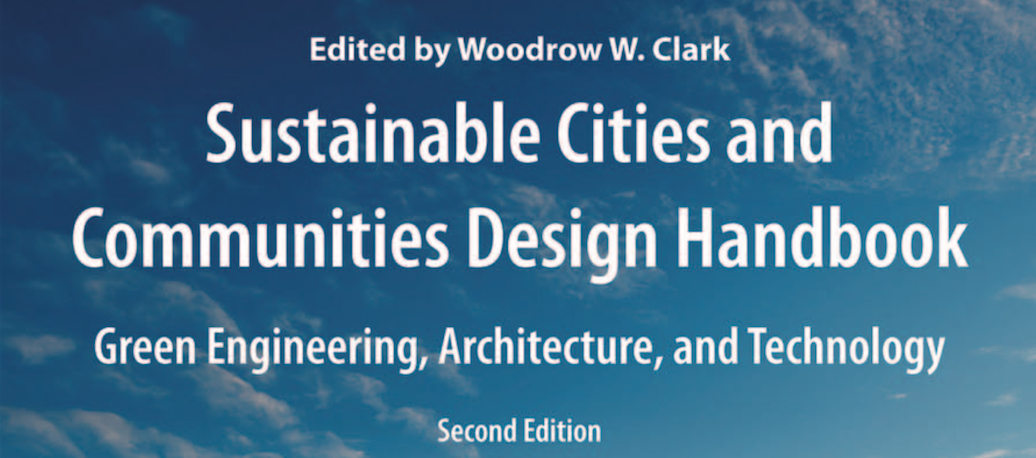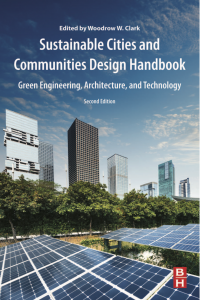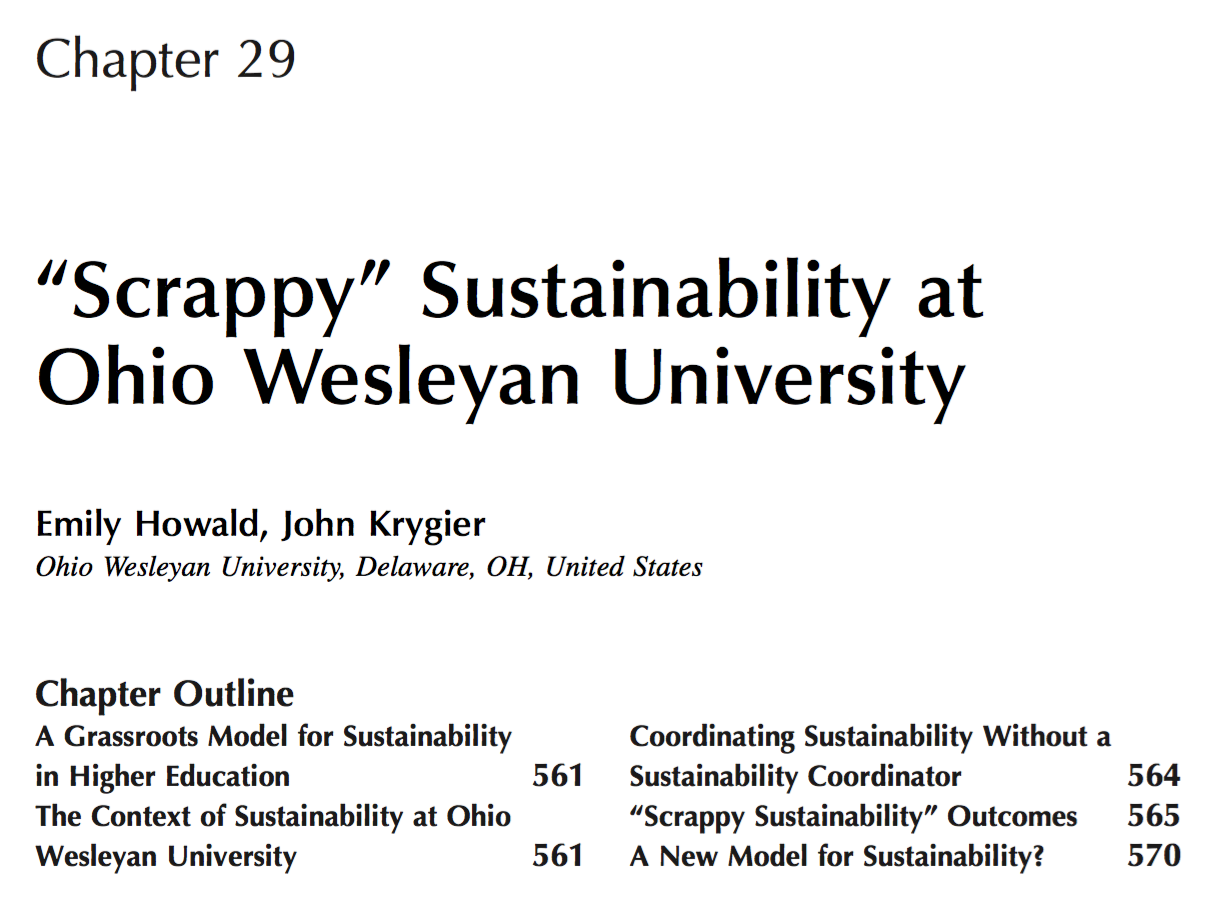
 Woodrow (Woody) Clark is an OWU alumnus (’67) long involved with environmental and sustainability efforts. The second edition of his Sustainable Cities and Communities Design Handbook (December 2017 info here and here) contains a chapter written by OWU student Emily Howald (OWU, ’18) and Professor of Geography John Krygier.
Woodrow (Woody) Clark is an OWU alumnus (’67) long involved with environmental and sustainability efforts. The second edition of his Sustainable Cities and Communities Design Handbook (December 2017 info here and here) contains a chapter written by OWU student Emily Howald (OWU, ’18) and Professor of Geography John Krygier.
“‘Scrappy” Sustainability at Ohio Wesleyan University” describes OWU’s sustainability efforts and strategies over the last decade. These efforts have been the work of students, staff, faculty, alumni and community members all working at a grassroots level. These efforts, in practice, have led us to develop a series of strategies, Scrappy Sustainability, which is particularly appropriate for colleges and universities.
The first page of the chapter below. PDF here.

…and a text from the first few pages:
“Scrappy” Sustainability at Ohio Wesleyan University
Emily Howald, John Krygier
Ohio Wesleyan University, Delaware, OH, United States
Chapter Outline
A Grassroots Model for Sustainability in Higher Education 561
The Context of Sustainability at Ohio Wesleyan University 561
Coordinating Sustainability Without a Sustainability Coordinator 564
“Scrappy Sustainability” Outcomes 565
A New Model for Sustainability? 570
A GRASSROOTS MODEL FOR SUSTAINABILITY IN HIGHER EDUCATION
There are colleges and universities with the expertise and financial resources to invest in large-scale, conspicuous sustainability efforts (such as large solar arrays, stylish LEED-certified buildings, and full-time sustainability staff) and there are those who do not. However, those without the funds for conspicuous sustainability are not necessarily excluded from substantive sustainability efforts. Indeed, we suggest that grassroots, “scrappy” sustainability efforts on college campuses and at other institutions may have certain benefits over top-down, high-investment sustainability.
THE CONTEXT OF SUSTAINABILITY AT OHIO WESLEYAN UNIVERSITY
Ohio Wesleyan University (OWU) is a small, private, liberal arts college in central Ohio that serves as a modest showcase for a relatively low-cost, grassroots, and distributed approach to sustainability. The university neither has a sustainability coordinator position nor any other employee with distinct expertise in sustainability. None of the faculty have specializations in the field, and there are no classes taught on the subject. As of yet, there is no official sustainability plan and there are neither funds nor donations set aside specifically for sustainability projects. OWU has, over the last decade, expanded its endowment, raised significant funds for student travel and research, and embarked on a substantial upgrade to campus student housing. These are all fundamentally important and easily justifiable priorities. Given this situation, it is easy for students, faculty, and staff to feel like not enough is being done to foster sustainability on campus. Instead of complaining about the lack of top-down, large-investment sustainability, a group of students, faculty, and staff have embarked on a grassroots effort to make sustainability work at OWU despite limited resources. Ultimately, we argue, sustainability efforts can succeed if those who believe in the value of sustainability actually do something, then persist in furthering the efforts until something takes hold, and then persist in keeping the efforts going. Successes with these smaller, “scrappy” efforts will, hopefully, lead to larger efforts, backed by a spreading culture of sustainability.
OWU has a rocky history with sustainability efforts. Many higher education institutions believe that they must be leaders in finding solutions to the environmental crisis by developing and promoting the knowledge, tools, and technologies needed to transition to a sustainable society. As the environmental movement emerged and developed in the 1960s and the 1970s, OWU established an Environmental Studies major, the first such program in an academic institution in Ohio. In its nearly 40-year existence, the program has produced hundreds of majors that have gone on to successful careers related to the environment. In 2009, a Sustainability Task Force was created to evaluate the President’s Climate Commitment (PCC), which 80% of students voted to support. Despite the lack of any direct negative consequences for not meeting the PCC goals, the Task Force was concerned about the capital investments and employee time needed to implement and monitor the necessary energy efficiency upgrades to campus facilities, and recommended that a sustainability coordinator be hired (rather than signing the PCC). In 2011, an American Recovery and Reinvestment Act grant funded a 2-year sustainability coordinator position. The university hired Sean Kinghorn for the position, and his efforts generated significant rebate funds for the university, as well as energy-saving efforts and dozens of sustainability projects (many led by students). In 2013, Kinghorn’s position ended, after the failure of several grants intended to acquire additional funds for the position. A student protest later that year demonstrated student commitment to the sustainability coordinator position. With the decision not to sign the PCC and the lack of funds to continue the sustainability coordinator position, one might expect the prospects for sustainability on campus to fade. At that point, the campus Sustainability Task Force set out on an effort to encourage grassroots sustainability efforts and create a campus sustainability plan, despite the setbacks.

